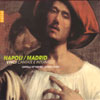Vinci Cantate Intermezzi
A Neapolitan delight that throws a welcome light on a Handel favourite
View record and artist detailsRecord and Artist Details
Composer or Director: Leonardo Vinci, José Melchor de Nebra, Francesco Petrini
Genre:
Vocal
Label: Astrée Naïve
Magazine Review Date: 13/2007
Media Format: CD or Download
Media Runtime: 72
Mastering:
Stereo
DDD
Catalogue Number: OP30274

Tracks:
| Composition | Artist Credit |
|---|---|
| Erighetta e Don Chilone |
Leonardo Vinci, Composer
Antonio Florio, Conductor Capella della Pietà de'Turchini Giuseppe Naviglio, Baritone Leonardo Vinci, Composer Roberta Invernizzi, Soprano |
| Sinfonia per Archi |
Leonardo Vinci, Composer
Antonio Florio, Conductor Capella della Pietà de'Turchini Leonardo Vinci, Composer |
| Graziello e Nella |
Francesco Petrini, Composer
Antonio Florio, Conductor Capella della Pietà de'Turchini Francesco Petrini, Composer Giuseppe de Vittorio, Tenor Roberta Invernizzi, Soprano |
| Adónde Fugitivo |
Leonardo Vinci, Composer
Antonio Florio, Conductor Capella della Pietà de'Turchini Cristina Calzolari, Soprano Leonardo Vinci, Composer |
| Triste, ausente, en esta selva |
Leonardo Vinci, Composer
Antonio Florio, Conductor Capella della Pietà de'Turchini Leonardo Vinci, Composer Roberta Invernizzi, Soprano |
| Cuando infeliz destino |
Leonardo Vinci, Composer
Antonio Florio, Conductor Capella della Pietà de'Turchini Cristina Calzolari, Soprano Leonardo Vinci, Composer |
| Tempestad grande amigo |
José Melchor de Nebra, Composer
Antonio Florio, Conductor Capella della Pietà de'Turchini Giuseppe de Vittorio, Tenor Giuseppe Naviglio, Baritone José Melchor de Nebra, Composer Roberta Invernizzi, Soprano |
Author: David Vickers
For more than two centuries Naples was a province of Spain, and after this ended in 1707 the remarkable cross-fertilisation of culture between them did not stop. Much of the Italian music featured here has been edited from sources in Spanish collections. The vast bulk of it is devoted to Leonardo Vinci (one of the most celebrated Italian opera composers of the 1720s). Only one short piece tacked onto the end is actually Spanish: a colourful fandango from José de Nebra’s zarzuela Vendado es amor, no es ciego (1744) in which three singers mockingly compare the squabbling goddesses of classical antiquity to bickering mothers-in-law.
Antonio Florio and Cappella della Pietà de’Turchini have already given unstinting service to the cause of music from Naples, but this is one of their best recordings so far. The playing and singing are theatrically charged without ever becoming crass or forced, and there is a lean articulacy evident throughout. This is no mean feat in two cliché-ridden intermezzi in which the comedy relies largely on long recitatives, but the programme has been intelligently chosen: Vinci’s Erighetta e Don Chilone (in which a young widow hoodwinks a wealthy old hypochondriac into marrying her by posing as a doctor) is entirely different in tone and style to Giuseppe Petrini’s Graziello e Nella (in which a young man – sung by a woman – heaps ridicule upon an old woman – sung by a man – who thinks she is still young and gorgeous). If these are fascinating and mildly amusing rather than magnificent, three cantate con strumenti by Vinci (sung in contemporary Spanish versions) offer ample musical rewards. Triste, ausente, en esta selva is superbly sung by Roberta Invernizzi – the central accompanied recitative is spectacular and highly dramatic. Cristina Calzolari is equally impressive in the other two cantatas. These cantatas give us a precious insight into why Vinci was reputedly one of Handel’s favourite composers.
Antonio Florio and Cappella della Pietà de’Turchini have already given unstinting service to the cause of music from Naples, but this is one of their best recordings so far. The playing and singing are theatrically charged without ever becoming crass or forced, and there is a lean articulacy evident throughout. This is no mean feat in two cliché-ridden intermezzi in which the comedy relies largely on long recitatives, but the programme has been intelligently chosen: Vinci’s Erighetta e Don Chilone (in which a young widow hoodwinks a wealthy old hypochondriac into marrying her by posing as a doctor) is entirely different in tone and style to Giuseppe Petrini’s Graziello e Nella (in which a young man – sung by a woman – heaps ridicule upon an old woman – sung by a man – who thinks she is still young and gorgeous). If these are fascinating and mildly amusing rather than magnificent, three cantate con strumenti by Vinci (sung in contemporary Spanish versions) offer ample musical rewards. Triste, ausente, en esta selva is superbly sung by Roberta Invernizzi – the central accompanied recitative is spectacular and highly dramatic. Cristina Calzolari is equally impressive in the other two cantatas. These cantatas give us a precious insight into why Vinci was reputedly one of Handel’s favourite composers.
Discover the world's largest classical music catalogue with Presto Music.

Gramophone Digital Club
- Digital Edition
- Digital Archive
- Reviews Database
- Full website access
From £8.75 / month
Subscribe
Gramophone Full Club
- Print Edition
- Digital Edition
- Digital Archive
- Reviews Database
- Full website access
From £11.00 / month
Subscribe
If you are a library, university or other organisation that would be interested in an institutional subscription to Gramophone please click here for further information.




